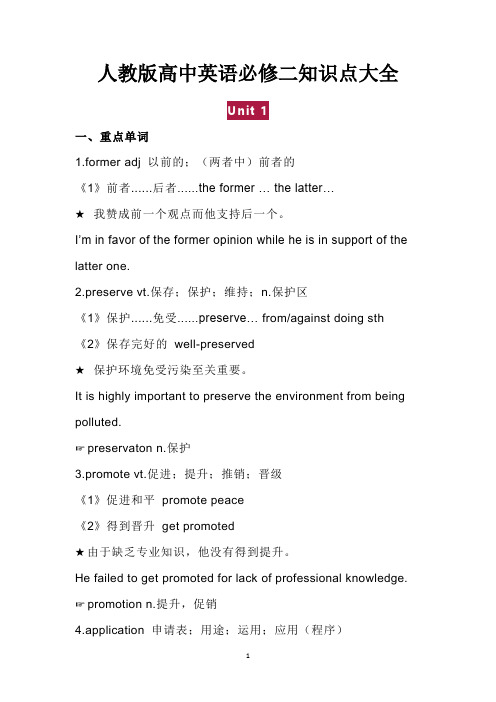人教版新课标高中英语必修一至必修二复习归纳
- 格式:doc
- 大小:212.00 KB
- 文档页数:29

新课标人教版英语必修1 Unit1--5句型背诵1. I wonder if it’s because I haven’t been able to be outdoors for so long that I’ve grown so crazy about everything to do with nature.(强调句).我不知道这是不是因为我长久无法出门的缘故,我变得对一切与大自然相关的事物都无比狂热。
2. It was the first time in a year and a half that I had seen the night face to face. (从句时态用完成时).这是我一年半以来第一次目睹夜晚。
3. Your friend, who doesn’t work hard, asks you to help him cheat in the end-of-term exam.(非限制性定语从句).你的一个朋友叫你在期末考试中帮他作弊,这个朋友平常不认真学习。
4. I stayed awake on purpose until half past eleven one evening in order to have a good look at the moon for once by myself.有一天晚上,我熬到11点半故意不睡觉,为的是独自好好看看月亮一次。
5. If you have some trouble (in) getting along with your friends, you can write to the editor and ask for advice.假如你在和朋友的相处上有问题,你能够写信给编辑向他征求建议。
6. Add up your score and see how many points you can get.把你的得分加起来,看看得了多少。


人教版高中英语必修二知识点大全一、重点单词1.former adj 以前的;(两者中)前者的《1》前者......后者......the former … the latter…★我赞成前一个观点而他支持后一个。
I’m in favor of the former opinion while he is in support of the latter one.2.preserve vt.保存;保护;维持;n.保护区《1》保护......免受......preserve… from/against doing sth 《2》保存完好的well-preserved★保护环境免受污染至关重要。
It is highly important to preserve the environment from being polluted.☞ preservaton n.保护3.promote vt.促进;提升;推销;晋级《1》促进和平promote peace《2》得到晋升get promoted★由于缺乏专业知识,他没有得到提升。
He failed to get promoted for lack of professional knowledge. ☞ promotion n.提升,促销4.application 申请表;用途;运用;应用(程序)《1》求职信 A job application (letter)《2》申请信,求职信A letter of application《3》向......提出申请→ apply to sb for sth→ make an application to sb for sth《4》致力于apply oneself/one’s mind to doing sth★你只有专心学习,才会通过考试。
You will pass the exam only if you really apply yourself to your study.☞ apply v.运用,应用5.banace n.平衡;均匀vt. 使平衡《1》保持平衡keep balance《2》保持均衡的饮食keep a balanced diet《3》失去平衡: lose one’s balance/ out of balance《5》使A和B平衡keep a balance between A and B《6》总的来说On balance6.proposal n.提议;建议《1》提出建议make/put forward a proposal《2》同意、接受提议approve of/accept a proposal★他们都同意我的建议,我们分摊计程车费。

高中英语必修一语法汇总Unit 1短语或词组是具有一定意义但不构成句子或从句的一组词。
一、名词短语(NP)名词短语是指以一个名词为中心构成的短语。
(1)These ideas may seem strange to you.作主语(2)Welove our great motherland very much.作宾语(3)Theman wearing a black coat is our teacher.作表语(4)Those beautiful flowers come from Yun’nan.作主语(5)Weelected him monitor of our class.作宾语补足语[归纳总结](1)名词短语在句中作名词用,一般用作主语、宾语、表语、宾语补足语等。
(2)名词短语由“(限定词)+(数词、形容词、形容词短语、描述性名词)+名词+(介词短语)”组成。
[名师提醒]限定词包括冠词(a,an,the)、指示代词(this,that,these,those等)、物主代词(my,your,his,her,our,their等)和不定代词(some,no,neither,both等)。
[巩固内化1]指出黑体部分所作的成分①He got threegold medals at the 23rd Olympic Games.作宾语②The tall building was built last year.作主语③This is avery interesting book.作表语④We made him capital of our team.作宾补二、形容词短语(AdjP)形容词短语是指以一个形容词为中心构成的短语,在句子中的功能相当于形容词。
(1)Theair today is nice and clean.作表语(2)Sheis a girl lively and lovely.作定语(3)Hefound the film very interesting.作宾语补足语[归纳总结](1)形容词短语在句中作形容词用,可以修饰名词或代词,作定语,还可用作表语或者宾语补足语等。

人教版高中英语必修一U n i t-2单元知识点(总10页)--本页仅作为文档封面,使用时请直接删除即可----内页可以根据需求调整合适字体及大小--必修一 Unit2 English around the world要点提炼 Section A重点词汇,短语,句式adj.官方的;正式的;公务的You will have to get official permission to cut down the trees.你得获得官方批准才可以砍伐这些树。
There will be an official inquiry into the matter.将对这件事进行正式调查。
【拓展】official 或 officer两者都有官员的意思,但是所指不同1,official常指政府官员或行政官员2,officer常指身特定制服的官员,如军官或者警官等。
练习:我爸爸是军官,而他爸爸是政府官员。
My father is an________ in the army, while his father is an________ in the government.答案:officer official3. native adj. 本国的;本土的 n.本地人,本国人The women are native people.这些妇女是本地人。
Finally, she returned to her native land.她最后返回了她的祖国。
The panda is a native of China.熊猫原产于中国。
【注意】native 做形容词用时,只能做前置定语。
be native to 意为(动植物)是…特有的,原产于…The tiger is native to India, 这种虎产于印度。
4. actually adv. 实际上;事实上(相当于in fact/as a matter of fact)He looked calm, but actually he was very nervous.他看起来很镇定,实际上却非常紧张。

人教版高中英语必修一知识点+语法总结(全面)-CAL-FENGHAI.-(YICAI)-Company One1高一主要语法点人教版必修一各单元知识点总结Unit One Friendship一、重点短语1.go through 经历,经受 get through 通过;完成;接通电话2. set down 记下,放下3. a series of 一系列4. on purpose 有目的的5. in order to 为了6. at dusk 傍晚,黄昏时刻7. face to face 面对面8. fall in love 爱上9. join in 参加(某个活动); take part in 参加(活动) join 加入(组织,团队,并成为其中一员)10. calm down 冷静下来11. suffer from 遭受12. b e/get tired of…对…感到厌倦13. be concerned about 关心14. get on/along well with 与…相处融洽15. be good at/do well in 擅长于…16. find it + adj. to do sth. 发现做某事是…17. no longer / not …any longer 不再…18. too much 太多(后接不可数n.) much too 太…(后接adj.)19. not…until 直到… 才20. it’s no pleasure doing sth 做… 并不开心 21. make sb. sth. 使某人成为… make sb. do sth. 使某人做某事二、语法----直接引语和间接引语概念:直接引语:直接引述别人的原话。
一般前后要加引号。
间接引语:用自己的话转述别人的话。
间接引语在多数情况下可构成宾语从句且不要加引号。
例:Mr. Black said, “ I’m busy.”Mr. Black said that he was busy.变化规则(一)陈述句的变化规则直接引语如果是陈述句,变为间接引语时,用连词that(可省略)引导,从句中的人称、时态、指示代词、时间状语、地点状语都要发生相应的变化。
人教版版高中英语必修二重点语法汇总Unit 1: 限制性定语从句和非限制性定语从句定语从句可分为限制性定语从句和非限制性定语从句。
限制性定语从句是指如果一个句子去掉定语从句后,主句的意思不是所要表明的意思,那么这个定语从句就是限制性定语从句。
非限制性定语从句则不用限制先行词。
最大的特点就是先行词后面有逗号隔开。
例如:XXX should be punished.XXX who breaks the rules should be punished.在第二个句子中,如果去掉定语从句,“Anyone should be punished”这个句子的意思就不完整了,因此这是一个限制性定语从句。
例如:She is good at speaking French。
XXX.This book was written by Jack。
who was here a moment ago.I have some friends。
XXX.这些句子中的定语从句都是非限制性定语从句。
限制性定语从句的连接词可以用who、whom或whose、which,但不能用that,也不能省略。
例如:She had eight children。
three of XXX.XXX is a Japanese。
whose wife is a Chinese.My sister。
who is a nurse。
got married last month.China has hundreds of islands。
the largest of which is XXX.非限制性定语从句还可以用when或where引导。
例如:She is going to Shanghai。
where she was born.We will go home next week。
when we won’t be so busy.除了前面提到的那些连接词以外,在以下两种情况下还可以用as作为定语从句的连接词:1.当先行词在从句中做主语或者宾语的时候,同时先行词又被same、so或者such修饰的时候。
人教版必修第二册全册重点单词短语Unit 1Cultural Heritage ........................................................................................................ - 1 - Unit 2Wildlife Protection ..................................................................................................... - 9 - Unit 3The Internet .............................................................................................................. - 17 - Unit 4History and Traditions .............................................................................................. - 24 - Unit 5Music ........................................................................................................................ - 31 -Unit 1Cultural Heritage【话题词汇】1.sculpture n. 雕塑;雕刻;雕像2.statue n. 塑像;雕像3.construct v t. 建设;建筑4.remains n. 遗迹5.splendid adj. 辉煌的;壮丽的6.gallery n. 画廊;美术馆7.exhibition n. 展览;展览会8.historical adj. 与历史有关的;史学的9.myth n. 神话10.legend n. 传说;传奇故事11.origin n. 起源;由来12.masterpiece n. 杰作13.rare adj. 罕见的14.unique adj. 独特的,特有的15.precious adj. 宝贵的16.well-designed adj. 设计巧妙的【话题短语】1.be situated/located in 位于2.preserve/protect...from... 保护……免于……3.natural wonder 自然奇观4.be in ruins 变为废墟5.belong to 属于6.non-material cultural heritage 非物质文化遗产7.traditional crafts 传统工艺品8.be listed in 被列入9.folk arts 民间艺术10.The cradle of the civilization 文明的摇篮【话题佳句】1.History and culture are the soul of the city and people should cherish the city's historic and cultural heritage as their own lives.历史和文化是一个城市的灵魂,人们要像爱惜自己的生命一样珍惜城市历史文化遗产。
必修一Unit 1直接引语与间接引语(Ⅰ)一.定义:1.直接引语:直接引述别人的原话2.间接引语:用自己的话转述别人的话二.直接引语变间接引语时要注意一下一个方面(1)陈述句:变间接引语时语序不变(2)一般疑问句:变间接引语时应首先在主句的谓语动词后加if/whether.再把语序变陈述语序(3)特殊疑问句:仍保持原有的疑问词,但语序变成陈述语序eg. He asked ,”Are you going home this weekend?”→He asked if/whether I was going home this weekend.“What do you want,Sara?” Mr Li asked.→Mr Li asked Sara what she wanted.3.某些成分的变化与不变(1).直接引语转化为间接引语时从句要注意5个方面的变化:①标点符号的变化“一主二宾三不变”及:直接引语中主语为第一人称则变为间接引语时人称按主语的人称变化;直接引语中主语为第二人称则变为间接引语时,人称与主句的宾语一致;若间接引语中主语为第三人称则变成间接引语时人称一般不需要变化。
④时态的变化一般现在时→一般过去时现在进行时→过去进行时现在完成时→过去完成时一般过去时→过去完成时过去完成时不变一般将来时→过去将来时⑤指示代词、时间状语、地点状语和动词的变化this→thatthese→thosenow→thenago→before/earliertoday→that dayyesterday→the day beforetomorrow→the next/following daythe day after tomorrow→in two days’ timecome→gohere→therethe day before yesterday→two days before/earliereg. He said ,”There books are mine.”→He said those books were his.(2)直接引语转化为间接引语时态五不变①直接引语为客观真理、永恒不变的事实、谚语或名人名言时eg .”The earth moves around the sun ,” the teacher told me.→The teacher told me the earth moves around the sun.Miss Guo said,”Where there is a sill,there is a way .“→Miss Guo said Where there is a sill,there is a way .②直接引语中有具体变过去的时间状语eg .Xiao Lin said ,”I was born on July 29,1992.”→Xiao Lin said she was born on July 19,1992.③习惯性动作或说话时仍然存在的情况eg .The boy said to us ,” I usually go to bed at ten every day .”→The boy told us he usually go to bed at ten every day.④当直接引语表示的客观时刻表时eg .Tom said,” The plane takes off at 6:30 a.m.”→Tom said the plane takes off at 6:30 a.m.⑤谓语中含有would,should,might,must,used to,had,hetter等eg .Tony said ,”Y ou should get up early.”→Tony said we should get uo early.Unit 2直接引语和间接引语(Ⅱ)一.直接引语为祈使句,变成间接引语时,常构成简单句型,可以按下列结构进行变化1.当祈使句表示要求和命令时,变间接引语常采用tell/command/order sb to do sth 的形式eg .”Hurry up .“He said .→He told me to hurry up.2.当祈使句表示请求时,变间接引语常采用ask/request/beg sb to do sth的形式eg .He said,”Please don’t be late.”→He asked me not to be late.二.句型变化注意事项1.直接引语中的呼语是祈使的对象,改为间接引语时常做引述动词的宾语.如原句中没有呼语,通常要加上宾语me,him,us等eg .He said,”Go and tell her,Jim.”→He asked Jim to go and tell her.2.直接引语中如果有客气的please或表示强调的助动词do,改为间接引语时必须去掉eg .He said to me,”Sit down,please.”→He asked me to sit down.Unit 3将来时1.be + v-ing 表将来时,当句子涉及确切的计划,明确的意图和为将来安排好的活动时,可用进行时表将来时。
高一主要语法点人教版必修一各单元知识点总结Unit One Friendship一、重点短语through 经历,经受 get through 通过;完成;接通电话2. set down 记下,放下 3. a series of 一系列4. on purpose 有目的的5. in order to 为了6. at dusk 傍晚,黄昏时刻7. face to face 面对面8. fall in love 爱上9. join in 参加(某个活动); take part in 参加(活动) join 加入(组织,团队,并成为其中一员)10. calm down 冷静下来11. suffer from 遭受12. be/get tired of…对…感到厌倦13. be concerned about 关心14. get on/along well with 与…相处融洽15. be good at/do well in 擅长于…16. find it + adj. to do sth. 发现做某事是…17. no longer / not …any longer 不再…18. too much 太多(后接不可数n.) much too 太…(后接adj.)19. not…until 直到… 才20. it’s no pleasure doing sth 做… 并不开心 21. make sb. sth. 使某人成为… make sb. do sth. 使某人做某事二、语法----直接引语和间接引语概念:直接引语:直接引述别人的原话。
一般前后要加引号。
间接引语:用自己的话转述别人的话。
间接引语在多数情况下可构成宾语从句且不要加引号。
例:Mr. Black said, “ I’m busy.”Mr. Black said that he was busy.变化规则(一)陈述句的变化规则直接引语如果是陈述句,变为间接引语时,用连词that(可省略)引导,从句中的人称、时态、指示代词、时间状语、地点状语都要发生相应的变化。
人教版新课标高中英语必修一至必修二复习归纳新课标高中英语2010-08-28 11:30:31 阅读243 评论0 字号:大中小订阅必修一Unit 1 Friendship1.基础梳理point upset ignore calm down cheat list share a series of crazy purpose dare thunder entire(~ly)trust according to power suffer recover suitcase situation disagree be concerned about walk the dog set down face to face be/get tired of get along with fall in love make a list communicate with 2.词语归纳1)add vt/vi加;添加;增添add up合计加起来,但在口语中有时用于否定句,表示“莫名其妙,不说明问题”。
add up to 总计共达,所有一切都说明,总而言之。
add sth(to sth)把……加到……里去。
add to 增加,扩建。
add 表示“继续说,补充说”。
区别add和increaseadd意思是“加,增加”,强调添加。
或者表示将数字加起来求和。
increase“增加”,表示在数量,产量,尺寸,程度等方面的增加。
2)cheat v 欺骗;作弊n 骗子;作弊者;骗人的事cheat sb of sth cheat sth out of sb 从某人处欺诈某物cheat on/at/in 作弊,欺诈3)list v 将事物列于表上;编事物的目录n 名单;目录;一览表make a list of 造表,列……表take…off the list 从表上去掉……stand first on the list 居首位,列前茅as listed above 如上所列3)shareshare in 分享,分担,共用share sth with sb 和某人共用/共享某事物share out 分配,分发;得到股息,升股息share(n.)in/of 一分,部分4)trust vi/vt 信任,信赖;依赖trust in 相信,信任,信仰trust to 依靠(运气等),依赖trust that… 希望,想5)suffer vt/vi 遭受,受到,蒙受;受痛苦,受折磨,受惩罚,受损伤suffer from 受……伤害;患……病痛注意:suffer 和suffer from 都不能用于被动语态6)calm vt/vi/adj. 使平静;使镇定。
平静的,镇静的,沉着的。
calm down 平静下来,镇定下来quite指人对外界事物感触的安静。
对人时,侧重不激动,平静温和,不发表意见。
still指完全没有声音或者没有动静,突然静止不动。
silent主要指人不爱说话,沉默不语。
7)concernbe concerned about 担心,关心as/so far as…be concerned 关于,至于,就某人而言have no concern for 毫不关心concern oneself in/with/about sth 忙于,从事;关心,关切have a concern in 和……有厉害关系be concerned in/with 参与,与……有关8)separate v/adj 分开,和……分手;单独的,分开的,不同的separate…from 使……和……分离9)reasonlose one‟s reason 失去理智,发狂by reason of 由于bring sb to reason 说服某人理智些within reason 合理without reason 不合理listen to reason 听从道理reason sb into/out of sth 以理说服某人做/不做某事10)powerbeyond /out of one‟s power 力所不及的,不能胜任的=not within one‟s powerin power 当权的,握有政权的come into power掌权,得势11)habitform / make a habit of doing=make it a habit to do sth 养成做某事的习惯be in the habit of 有……的习惯fall/get into a habit of 沾染(养成)……习惯break(off)a habit=get out a habit 戒除一种习惯form good habits 养成良好的习out of habit 出于习惯12)according to为介词短语,后跟名词,代词,不能很从句,表示“根据;按照;试……而定”。
according to其后引出的信息应来自别人或者别处,不能来自说话者自己。
according to其后不能跟opinion,view等名词。
according as 相当于连词,后跟从句,意为“正像,根据,按照,如果”。
13)join in区别join;join in;take part in;attendjoin 参加某个组织或者团体(党派,军队等)<ps:这些名词前面要加定冠词>,并且成为其中的一员。
join in 参加正在进行着的活动,如游戏,讨论,辩论,谈话等。
take part in 参加会议或者群众性的活动,并且在其中法会一定的作用。
attend 参加会议、仪式、婚礼、葬礼、上课、上学、听报告等。
重在强调“参与”的动作,不强调参加者的作用。
14)dare作实意动词有人称和数的变化,也有时态的变化;作情态动词,用于否定句,疑问句和条件句中,有时态的变化,但是没有人称和数的变化。
①在肯定据中的dare,dares,dared之后,不定式一遍加to。
②在否定句中和疑问句中的dare之后,不定时一般不加to。
③在用do或者does构成的否定句和疑问句中,理论上虽然应该有to,实际使用却经常把to 省略。
I dare say…我敢打赌说……15)go through 经历;经受;通过考试;经过;审阅;检查go with 伴随,与……协调go up 上升;建起;上涨go over检查,审查;复习,重温go out 熄灭;公布;播出go ahead 进行,进展;(with)赞同go into从事,参加(某一行业);调查16)get along with 同……相处;进展get away 离开;逃避get back 回来;拿回get down 拿下;写下get in 进入;收获get down to 开始认真做……get on/off 上/下车get over 克服;战胜get across 被理解get through 完成;通过;接通电话get up 起床get it 明白,理解;猜中17)with复合结构,也可以叫做独立主格结构,在格式上没有谓语动词,在句中常作状语,表示伴随,原因,方式,条件等。
①with+名词+介词短语。
在句中作状语,作后置定语。
②with+名词/代词+过去分词。
其中过去分词表示被动或者完成了的动作。
③with+名词/代词+现在分词。
其中现在分词表示主动或者正在进行的动作。
④with+名词/代词+不定式。
其中不定式表示将要发生的动作。
⑤with+名词/代词+形容词。
18)no longer=not…any longer 表示不再继续或者再现过去某一时刻发生或存在而一直延续的动作/状态时,常用于过去时、现在时或者将来时的句子中。
no more=not…any more 表示再也不重复过去反复发生的动作时,常用于过去时或者将来时的句子中。
When he saw the toy,the baby cried no longer.当看到玩具时,那婴儿不再哭了。
Now she wasn‟t afraid any more..现在她再也不害怕了。
19)①settle down to 决心去做……,专心去做…… settle on/upon 决定……,选定……②have trouble with 使伤脑筋,苦恼;跟某人闹别扭ask for trouble 自讨苦吃be in trouble 在困境中,有纠纷get sb into trouble 陷入困境make trouble 惹麻烦put sb to trouble 麻烦某人take the trouble to do 费力做3.语法直接引语变为间接引语(注意:变化时句子一定为陈述句语序。
)人称的变化①直接引语中主语第一人称或者被第一人称所修饰,人称要与“讲话人”的人称一致。
②直接引语的第二人称,或者被第二人称所修饰,人称要与“听话人”的人称一致。
③直接引语中的第三人称不变化。
“一随主,二随宾,第三人称不更改”。
二、时态的变化直接引语——间接引语一般现在时——一般过去时一般过去时——过去完成时现在进行时——过去进行时现在完成时——过去完成时过去完成时——过去完成时一般将来时——过去将来时时态不变化的情况:①直接引语是客观真理。
②直接引语是过去进行时,时态不变。
③直接引语中有具体的过去某年、某月、某日作状语,变为间接引语时,时态不变。
④直接引语如果是一般现在时。
表示一种反复出现或习惯性的动作,变间接引语,时态不变。
⑤如果直接引语中的情态动词没有过去时的形式(例:ought to,had better, used to)和已经是过去时的形式时,(例:could, should, would, might)不再变。
Unit2 English around the world1.基础梳理voyage conquer native apartment modern actually present vocabulary usage governme nt fluently latter enrich command request recognize accent identityplay a role in come up such as even if base on make use of by the 1600‟s more than2.词语归纳1)includeinclude是及物动词,后跟名词,代词或者动名词作宾语,或者跟宾语+介词短语等。
including通常为介词,相当于having(sb/sth)as a part,包括(某人某物)在内,可与过去分词included互换。
2)present作形容词,若表示“在场的,出席的”通常用作标标语或者后置定语;若表示“现在的,现有的”,通常用作前置定语。